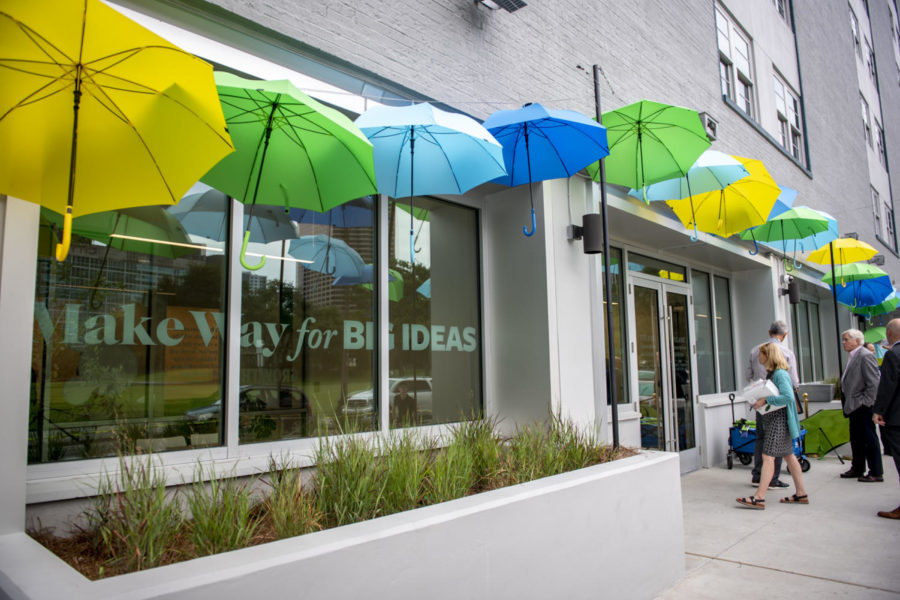Can New Orleans attract innovation? Institute argues yes
November 11, 2022
Kimberly Gramm knows New Orleans is not Silicon Valley — at least not yet.
But Gramm, head of Tulane University’s new Innovation Institute, said change is coming. Bringing new chances to the city’s traditionally tourist-centered economy, the Institute is pleading a determined case to a generation of the state’s young entrepreneurs who have long fled to pursue their dreams in Texas or on the nation’s coasts.
Build your ideas here. Invest here. Stay.
“We are where you want to go to explore what that means,” Gramm said.
That plea is the crux of the Innovation Institute, which launched this summer. The Institute will provide support and funding for Tulane students, faculty and New Orleans residents seeking to create products and businesses in the region.
It is the latest sign of a budding revolution across the South. Fed up with a culture that has for decades centered hubs of investment and research on the east and west coasts, cities like New Orleans are done sitting on the sidelines — they want in.
Here, Tulane is undertaking an expansion into downtown and revitalizing the defunct Charity Hospital. That effort coincides with the city’s latest attempts to create a bioinnovation district Downtown, modeled after a similar project in St. Louis that created 6,000 jobs.
A group of angel investors poured $1 million into local startups last March. In 2021, two prominent startups called Levelset and Lucid sold for $500 million and over $1.1 billion, respectively. And there are new projects like Obtala Sciences and AxoSim, Inc., two biotech firms, attracting money and jobs to the city.
It is an issue that cuts deep in a state historically plagued by the problem of “brain drain” — its best and brightest leaving in search of better jobs, better pay and better chances.
But now, Gramm hopes, if she can help some students grow their ideas here, more will follow.
She said the process tends to snowball: ideas create opportunities. Those ideas — new technologies, medical inventions, or businesses — can turn into products, companies and jobs.
Those jobs allow young engineers and entrepreneurs more chances to find careers and live in a community of like-minded innovators.
But students are key.
“Students play a really important and profound role,” Gramm said. “Brain drain comes from people thinking that they don’t have those kinds of opportunities.”
The Institute, which will move to Charity Hospital once renovation is complete, aims to create opportunities for student startups. It expects to draw $100 million of investment and will provide resources like proof of concept funding to students. The Institute is also launching a startup weekend — a conference where students develop a business in two days — and investor pitches this spring. And it plans to launch a seed venture capital fund to invest in local startups.
Gramm also said that this fall she is meeting with faculty from each discipline at Tulane, from art to engineering, to discuss opportunities for students.
“Students are works in progress, because they’re learning, but they are assets,” Gramm said. “They will contribute to our local economy.”
Attaining that feat comes with challenges. The biggest? Funding projects that would typically go to the coasts and changing outsiders perceptions of New Orleans. And real change can take decades.
Gramm led innovation projects at Texas Tech University before coming to Tulane. She has also worked in Miami, Gramm said, a tourist community that became a beacon for start-ups. She hopes the same can happen here.
“Creating community around entrepreneurs and innovators is very important for their survival, because otherwise, they feel very alone,” Gramm said. “The answer is the Institute.”
In its first year, the Institute has not yet proved it can attract students to New Orleans, but for many, interest is growing.
Maryl Wright, a New Orleans native and Ph.D. student at Tulane, said the Institute could give her a chance she never thought she would get: to stay. She is studying cancer technology and never wanted to leave her home state but grappled with the lack of opportunity for bioinnovation careers here.
“The opportunities that I’m looking for, there aren’t many here in this region,” Wright said. “If you want to say, work outside of academia, you’re pretty much forced to relocate.”
Chandler Monk, a Tulane bioinnovation student originally from Virginia, wants to stay too. She is working to patent a rapid test for cytomegalovirus, a virus that can cause cognitive dysfunction and hearing loss in infants.
She is determined to create that in New Orleans, but faces skepticism from peers and friends.
“Most of the people I talk to are like, ‘Get out,’” Monk said.
She knows peers in the program who have left — either for Texas or for the North Carolina Research Triangle anchored by Duke University, North Carolina State University and University of North Carolina at Chapel Hill.
Still, Monk wants to stay. There are signs of a new wave of innovation here, she said, and she wants to be a part of it. But she needs the help.
“Just that insight of being like, ‘Hey, I’ve seen people do this 1000 times before, and they have failed doing this, but they’ve succeeded doing this,’” Monk said. “I think that that’s really going to make a huge difference.”























Leave a Comment